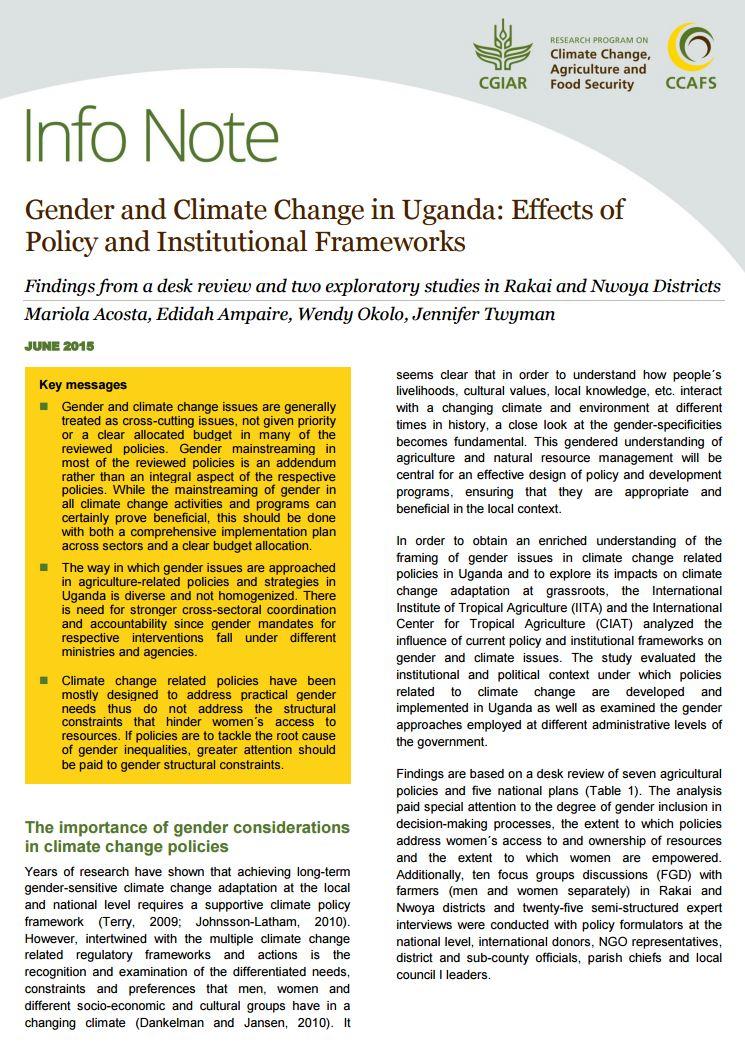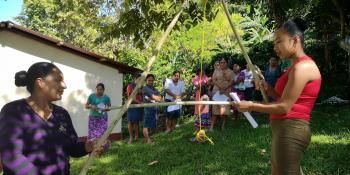Cultivating equality in a changing climate: the need for appropriate gender budgets

More resources needed if gender considerations introduced in agricultural and climate change policies are to be effectively implemented and enforced in Uganda.
Sipping my morning coffee on Tuesday 8 March, I reflected on how lucky I was to be living in a country where International Women's Day (IWD) is celebrated as a national holiday. Uganda, together with a few other countries in the world, dedicates 8 March with a bank holiday to pay tribute to their women, to celebrate their achievements and to acknowledge their key role in sustainable national development. Fortunately, the day also serves as a time to make a reckoning of the state of women in the country and to reflect on what further actions are needed to achieve a more gender-equal Ugandan society.
At the national policy-making level, the commitment that Uganda has had towards gender is undeniable. The Ugandan Constitution stipulates in Article 33 that "women shall have the right to equal treatment with men, and that right shall include equal opportunity in political, economic, and social activities” and towards that end, institutions like the Equal Opportunity Commission and the Ministry of Gender, Labour and Social Development have been established over the years.
In the field of agriculture and climate change, national policies and strategies have overall incorporated gender considerations as a key component in their respective activities and programs. A recent policy review, carried out by the CGIAR Research Program on Climate Change, Agriculture and Food Security (CCAFS) supported Policy Action for Climate Change Adaptation (PACCA) project, acknowledged a progressive engagement of issues of gender and climate change in the policy documents. The review also highlighted some drawbacks such as the use of unclear gender terminology and stereotypes, an insufficient consideration to gender structural constraints and an ineffective decentralization to implement gender considerations.
Indeed, the recognition of gender-differentiated constraints, needs and challenges in a quickly changing climate is fundamental for effective mitigation and adaptation programs in Uganda, but successful implementation will also require an adequate budget. PACCA researchers are currently in the process of carrying out an analysis of district and sub-county gender budgets in Uganda, uncovering the nature and magnitude of the finances allocated towards women’s empowerment in sub-national level governance. The preliminary results are worrisome, with gender-related activities being allocated less than 1% of the total annual budget and with some of the study districts and sub-counties having no gender budget at all. In fact, in some cases the celebrations of the IWD were the only gender activity carried out in a given financial year, and in many others these celebrations accounted for more than half of the gender budget in the district or sub-county.
While it is of enormous importance to acknowledge the role of women in a nation’s development and to celebrate IWD, the enthusiasm of these celebrations should be accompanied by an annual budget that would permit the implementation of all the gender activities considered in the national policies, district and sub-county development plans.
There is little doubt that Uganda as a society has long ago “Pledged for Parity” and it is continuously working towards achieving a more equal society. However, to this end, more financial and human resources are needed at all governance levels if the gender considerations already introduced in agricultural and climate change policies are to be effectively implemented and enforced. With so much achieved already, we have high hopes and expectations for where the journey towards gender equality will take the Ugandan society in the years ahead.
The PACCA project is led by the International Institute of Tropical Agriculture (IITA) and works with the International Center for Tropical Agriculture (CIAT), the World Agroforestry Centre (ICRAF), the International Livestock Research Institute (ILRI), and Bioversity International. The group is collaborating with relevant ministries and departments, national research institutions and other non-state agencies involved in climate change work in Uganda and Tanzania. PACCA seeks to inform and link policies and institutions from national to local level for the development and adoption of climate-resilient food systems in Uganda and Tanzania.
Learn more: Visit project page
Mariola Acosta is a Research Fellow at the International Institute of Tropical Agriculture (IITA) in Uganda and PhD candidate at Wageningen University. Blog editted by Vivian Atakos, Communications Officer, CCAFS East Africa.




